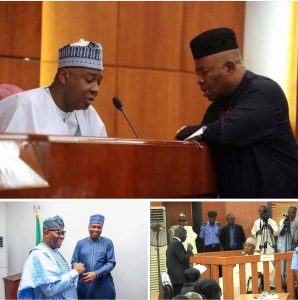INEC to Allow Prison Inmates Vote in 2027 Elections — Chairman Mahmood Yakubu Confirms
In a development that could redefine Nigeria’s electoral landscape and expand the boundaries of democratic participation, the Chairman of the Independent National Electoral Commission (INEC), Prof. Mahmood Yakubu, has announced that prison inmates across the country will be allowed to vote in future elections — including the high-stakes 2027 general polls.
Yakubu made the disclosure on Friday, August 8, 2025, when he hosted the Comptroller General of the Nigeria Correctional Service (NCoS), Sylvester Nwakuche, at INEC’s headquarters in Abuja. The decision, he said, aligns with a judgment of the Court of Appeal affirming the right of certain categories of inmates to register and vote.
For decades, Nigeria’s prison population — officially termed “inmates” under correctional reforms — has been effectively disenfranchised. While constitutional provisions did not expressly strip prisoners of their right to vote, the absence of electoral arrangements, coupled with security and logistical barriers, meant that in practice, prisoners could not participate in elections.
Prof. Yakubu’s declaration represents one of the most significant policy shifts in Nigeria’s democratic history, potentially enfranchising tens of thousands of citizens previously excluded from the ballot box.
“This is not a privilege we are extending as a matter of benevolence,” Yakubu stressed. “It is a right that has been upheld by the courts, and INEC, as an independent electoral body, has a constitutional duty to ensure that every eligible Nigerian can exercise that right, subject to the laws of the land.”
He added that the decision will be implemented carefully, taking into account legal definitions, security arrangements, and the integrity of the electoral process.
The recent momentum for inmate voting rights stems from a string of court cases culminating in a Court of Appeal ruling that clarified the voting rights of prisoners, especially those on remand or awaiting trial.
YOU MAY READ
INEC to Begin Nationwide Voter Registration on August 18 Ahead of 2027 Elections
The Nigerian Constitution, under Section 77(2) and Section 117(2), grants every citizen who has attained the age of 18 the right to register and vote, subject to the provisions of the Electoral Act. Nowhere in these provisions does it categorically bar prisoners from voting. However, Section 137 and 182 of the Constitution disqualify certain categories of convicted persons from holding public office — but not necessarily from voting.
Legal experts point out that the distinction is crucial. While convicted criminals serving prison terms after final judgment may face restrictions, those awaiting trial are constitutionally presumed innocent until proven guilty. Denying them voting rights, the courts held, would amount to unlawful disenfranchisement.
Justice Ibrahim Saulawa, who delivered the Appeal Court judgment in favour of inmate voting rights, stated:
“Citizenship rights cannot be suspended by mere incarceration pending trial. The state must uphold the presumption of innocence and guarantee the exercise of rights except where expressly limited by law.”
The path from judicial ruling to practical implementation is anything but straightforward. Prof. Yakubu revealed that INEC has been in consultation with the NCoS for several months to work out operational details.
For Comptroller General Nwakuche, the policy is more than a legal obligation — it’s a matter of human rights and democratic inclusion.
Nigeria’s correctional facilities currently hold over 81,000 inmates, with a staggering 66% — more than 53,000 individuals — in pre-trial detention. Many of these detainees have spent years in custody without conviction due to systemic delays in the justice process.
“These are Nigerians who have not been found guilty of any crime by a court of law,” Nwakuche emphasised. “To deny them the right to vote is to punish them before conviction, which is contrary to the spirit of our Constitution and international human rights standards.”
While the number of eligible inmate voters will not fundamentally alter national election outcomes, in tightly contested races — particularly in state or local elections — their votes could be decisive.
Political analysts note that:
- Urban States with Large Correctional Facilities such as Lagos, Rivers, Kano, and Abuja could see inmate votes become a marginal but potentially swing factor.
- Advocacy Groups and Opposition Parties may mobilise to engage this newly enfranchised population, though access restrictions will limit direct campaigning.
- Perception Battles will play out, with some political actors likely to frame the policy as a progressive step for democracy, while others may label it controversial or unnecessary.
Not everyone is convinced the move is prudent. Critics cite several concerns:
- Security Risks: Moving election materials into prisons and ensuring safe voting could strain already stretched security resources.
- Manipulation Risks: Critics fear that a controlled environment like a prison could be vulnerable to voter coercion, especially if facility staff hold political biases.
- Public Perception: Some Nigerians may resist the idea of “criminals voting,” conflating awaiting-trial inmates with convicted felons.
- Resource Allocation: Given INEC’s logistical challenges in conducting elections nationwide, adding prison voting could stretch budgets and personnel.
Human rights organisations, however, largely welcomed the announcement. Groups like the Prisoners’ Rehabilitation and Welfare Action (PRAWA) and the Civil Society Legislative Advocacy Centre (CISLAC) hailed it as a victory for justice and democratic inclusion.
“This is about human dignity,” said Dr. Uju Agomoh of PRAWA. “If we believe in the rule of law, then the presumption of innocence must mean something in practice. Allowing eligible inmates to vote sends a powerful message that Nigeria’s democracy is maturing.”
Nigeria’s move is not without precedent. Around the world, policies on prisoner voting vary widely:
- Full Voting Rights: Countries like South Africa, Canada, and Kenya allow all prisoners to vote, regardless of conviction status.
- Partial Voting Rights: The UK permits certain categories of inmates, such as those on remand, to vote; Australia has similar restrictions.
- Complete Disenfranchisement: In the US, many states bar convicted felons from voting, sometimes even after release.
Nigeria’s approach — focusing on awaiting-trial inmates and certain non-disqualified convicts — aligns more closely with the partial voting rights model.
Prof. Yakubu underscored that INEC will seek the intervention of the National Assembly to codify procedures and avoid ambiguities.
“Clear legislation will ensure uniform application across all states and protect the process from legal disputes,” he noted. “We want to avoid a situation where the policy is challenged mid-election because of procedural gaps.”
Lawmakers are expected to debate amendments to the Electoral Act to accommodate the policy. Such debates could become politically charged, given the sensitivity around voting rights for incarcerated individuals.
If implemented, the 2027 general elections will mark the first time in Nigeria’s history that a segment of the prison population participates in the democratic process.
The rollout will likely begin with a pilot phase during off-cycle gubernatorial elections in 2026, allowing INEC to test and refine procedures before the nationwide general polls.
For Prof. Yakubu, the broader vision is clear:
“Democracy is strongest when it is most inclusive. We cannot claim to be a true democracy if we continue to exclude citizens whose rights remain intact under the law. This is about justice, about equality, and about building a Nigeria where every voice counts.”
The decision to enfranchise eligible inmates is not merely an administrative adjustment; it is a statement about the type of democracy Nigeria aspires to be. It challenges societal prejudices, compels legal clarity, and demands institutional innovation.
Whether this move will strengthen trust in the electoral process or fuel fresh controversies will depend on how effectively INEC, the NCoS, political actors, and civil society manage the delicate balance between inclusion, security, and integrity.
As the countdown to 2027 begins, Nigeria’s democracy stands on the cusp of a significant evolution — one where the voices of those behind bars may, for the first time, echo in the nation’s ballot boxes.





